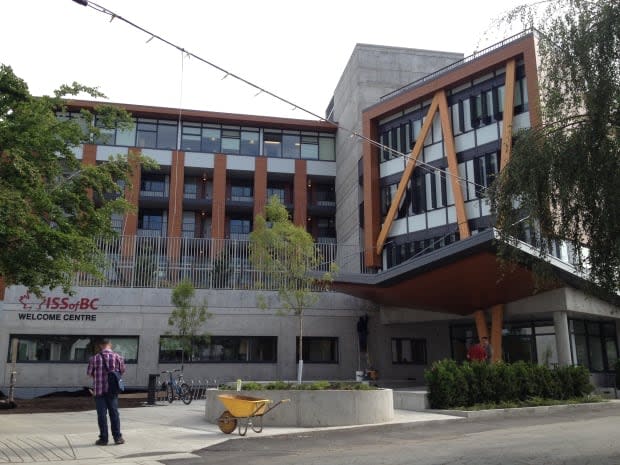Richmond shelters struggling to accommodate newcomers

The City of Richmond is calling on the federal government to provide housing for refugees and asylum seekers as shelters in Greater Vancouver fill up with newcomers.
On March 4, a city committee passed a motion to write a letter urging the government to build more temporary homes or reimburse the city for housing newcomers at their facilities.
Coun. Carol Day, who put forward the motion, said a surge in refugee claimants has overwhelmed homeless shelters in Richmond.
"We've been housing them for a long time ... and it takes spots away from people that really do need the homeless shelter," she told CBC's The Early Edition.
The motion is expected to pass at a council meeting on Monday night, and the letter would be sent soon afterwards, according to Day.
About one-third of the 632 people who stayed in the Richmond House Emergency Shelter's 30 beds last year were refugees or asylum seekers, Day said. The shelter is run by the city and the Salvation Army.
Meanwhile, more than 160 people are experiencing homelessness in Richmond, according to the most recent count available.
Richmond is not alone. It's a predicament that other cities across the country such as Winnipeg, Toronto and Ottawa are also facing.
Like Richmond, local governments in Ottawa and Toronto have asked the federal government for help.
'Significant' role from provinces, cities
For its part, the federal government has earmarked about $362 million for cities and provinces struggling to cope with the rising number of refugee claimants through the Interim Housing Assistance Program (IHAP).
IHAP is a cost-sharing program that provides reimbursement to provinces and municipalities for expenses related to the provision of interim housing for asylum claimants.
"The Government of Canada recognizes the significant role provincial and municipal governments play across the country in providing temporary shelter to asylum claimants," said a statement from Immigration, Refugees and Citizenship Canada (IRCC).
The City of Richmond has not said if it would participate in the program.
Meanwhile in the Lower Mainland and throughout B.C., homeless shelters are struggling to keep up with demand as the rise of newcomers puts pressure on the already overburdened system.
Last year, about 7,700 refugee claims were made in B.C., that's almost double the 3,895 claims that were made in 2022, according to a statement the province made to the CBC.
It said a majority of the claimants reside in Metro Vancouver.
In a statement to CBC, the Salvation Army's communications manager Gavin Randhawa said refugees or asylum seekers take up to 50 per cent of the space in some of their shelters in Metro Vancouver.
Day said the asylum seekers and refugees should have somewhere to go to get the services they need.
The Richmond motion recommends building modular housing and renting empty hotel rooms for refugees and asylum claimants.
"They should have a place to go," she said.
"If we can't house them, should we be letting them in," Day asked. "That is a federal responsibility."
IRCC said since 2017, Ottawa has provided $6 million to B.C. in support for, "alleviating asylum-related housing pressures."
Distinguishing between asylum seekers, assisted refugees
Refugee claimant advocate Katya Avalos said it's important to distinguish between asylum seekers and government-assisted refugees (GARs) to understand which group is ending up in shelters and whether the city or the federal government should foot the bill for sheltering them.
"I think there's a little bit of a confusion here," Avalos, the community engagement director for the Multi-Agency Parnership (MAP), said during an interview with CBC's The Early Edition. MAP is a collaborative organization made up of government, non-government and non-profit agencies in Metro Vancouver and the Fraser Valley that work with refugee claimants.
GARs are screened abroad and undergo security and health screenings prior to being issued a visa to come to Canada, Avalos said. They are referred by the UN High Commissioner for Refugees, another designated referral organization or a private sponsorship group.
When they arrive in Canada, they are given permanent resident status, receive financial support and housing from Immigration, Refugees and Citizenship Canada (IRCC) for about a year, Avalos said.
"This is not the population that's currently driving up the numbers and taking up [shelter] spaces," Avalos said.
In contrast, an asylum seeker — also called an asylum claimant or refugee claimant — is anyone who was forced out of one country and came to Canada asking for safe haven because of their dire situation.
They have been let in, provisionally, after declaring at any Canadian port of entry that they are seeking refugee status and being deemed eligible by the Canada Border Services Agency or IRCC.
To qualify as a refugee, a hearing before the Immigration and Refugee Board must agree that the asylum claimant can't go home because of a risk to their life or fear of persecution.
Many asylum seekers can't get federal help if their claims haven't been fully granted, leaving many of them stuck in limbo with nowhere to sleep.
"Because there is no program to support them on arrival, they're left with their own means to find housing, to find support," Avalos said.
Most of them exhaust all their resources making the long journey to Canada, which is why they end up homeless or in shelters, she said.
The refugee claimant advocate said she agrees with the Richmond council's motion and urges the federal government to invest in transitional housing for asylum seekers.
IRCC says the onus of managing and delivering social services, including social assistance, education, housing and legal aid to asylum claimants, falls on the shoulders of provinces and municipalities, but with the help of federal funding.
